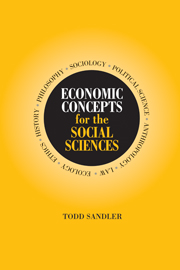Book contents
- Frontmatter
- Contents
- Table and Figures
- Preface
- 1 Economics without Apology
- 2 Back to the Future: Political Economy
- 3 In Another's Shoes: Games, Strategies, and Economics
- 4 It Takes Two or More: Public Economics and Collective Action
- 5 Government for the Politician? Public and Social Choice
- 6 Institutions Matter: The New Institutional Economics
- 7 Knowledge Is Power: Asymmetric Information
- 8 Everything Ties Together: General Equilibrium
- 9 Laboratory Economics: Of Rats and Men
- 10 Before Yesterday and Beyond Tomorrow: Intergenerational Economics
- 11 Fish, Space, and Spaceship Earth: Bioeconomics and Interdisciplinary Economics
- 12 Crystal Ball Economics: Rational Expectations
- 13 How Do We Get There from Here? Transition Economies and Policy Reforms
- 14 Economic Growth: Endogeneity, Institutions, and Other Concepts
- 15 Economic Visions of Future Horizons
- References
- Author Index
- Subject Index
10 - Before Yesterday and Beyond Tomorrow: Intergenerational Economics
Published online by Cambridge University Press: 14 May 2010
- Frontmatter
- Contents
- Table and Figures
- Preface
- 1 Economics without Apology
- 2 Back to the Future: Political Economy
- 3 In Another's Shoes: Games, Strategies, and Economics
- 4 It Takes Two or More: Public Economics and Collective Action
- 5 Government for the Politician? Public and Social Choice
- 6 Institutions Matter: The New Institutional Economics
- 7 Knowledge Is Power: Asymmetric Information
- 8 Everything Ties Together: General Equilibrium
- 9 Laboratory Economics: Of Rats and Men
- 10 Before Yesterday and Beyond Tomorrow: Intergenerational Economics
- 11 Fish, Space, and Spaceship Earth: Bioeconomics and Interdisciplinary Economics
- 12 Crystal Ball Economics: Rational Expectations
- 13 How Do We Get There from Here? Transition Economies and Policy Reforms
- 14 Economic Growth: Endogeneity, Institutions, and Other Concepts
- 15 Economic Visions of Future Horizons
- References
- Author Index
- Subject Index
Summary
I have always been fascinated by the interrelationships and interactions among generations. In airports, I enjoy looking at children and parents and seeing how similar they appear in both looks and actions. After my son was born, I closely observed him as a baby and a toddler to discern the innate character that he had inherited from me or my wife. Of course, whenever he did something that epitomized one of our annoying traits, one of us would knowingly glance at the other with raised eye-brows and think, “Yes, he is definitely your son!” As he grew older, it became more difficult to identify the distinction between genotype and phenotype, that is, between his inherited and his environmentally determined characteristics. And just when I became convinced that he displayed a random mix of our collective genetic backgrounds combined with an imitation of our behavior, he would say or do something completely foreign to both my wife and me. I then pondered whether this novel behavior was some atavistic characteristic of a long-lost relative or an innovation all his own.
Clearly, each of us possesses a particular identity – a unique mix of genetic code, mimicked behavior, and random innovations. I recognize this better than most people because I am a clone – an identical twin – who grew up with my brother in the same household. Despite our shared genetic makeup and virtually identical environment, we are not the same.
- Type
- Chapter
- Information
- Economic Concepts for the Social Sciences , pp. 161 - 184Publisher: Cambridge University PressPrint publication year: 2001



